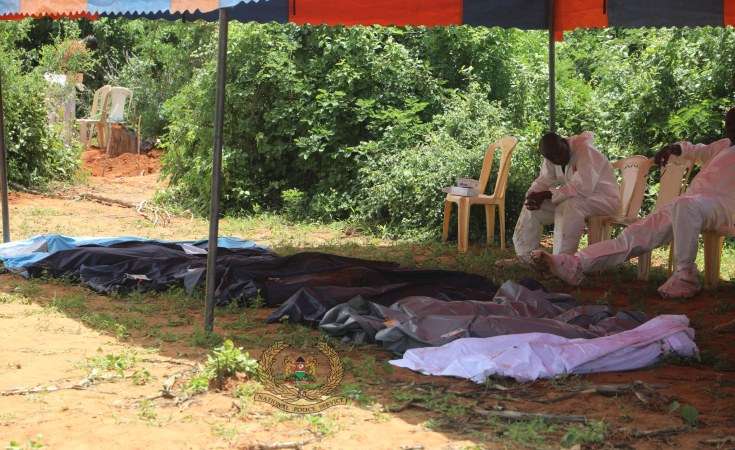Nairobi — President William Ruto has likened controversial pastor Paul Mackenzie of Good News International Church to a terrorist who uses religion to advance what he described as "weird and unacceptable ideologies" after radicalising thousands, some of who starved to death.
President Ruto expressed deep concern over the revelations in Kilifi's Shakahola forest where more than 40 bodies have been exhumed so far with many more believed to be buried there.
"What we are seeing in Kilifi, in Shakahola, is akin to terrorists. There is no difference between Mackenzie who pretends and postures as a pastor when in fact he is a terrible criminal," Ruto said
Speaking Monday when he presided over the pass-out parade of the Kenya Prisons Service cadets, Ruto called on Kenyans and different agencies in the country to be on the lookout for those who want to abuse the religious sector and those masquerading as religious persons.
"Terrorists use religion to advance their heinous acts. People like Mackenzie are using religion to do the same thing," he said.
A full-scale investigation has been launched into the Good News International Church and its leader since police stormed the forest at Shakahola and discovered the first bodies last week.
The Head of State said that he had instructed the agencies responsible to take up the matter and to get to the root cause of the activities of the people who want to use religion to mislead Kenyans in the name of religion.
Over the weekend, dozens more corpses were unearthed and an 800-acre (325-hectare) area of woodland declared a crime scene as authorities seek to understand the true scale of the so-called "Shakahola Forest Massacre".
Inspector General of Police Japhet Koome was expected to visit the site on Monday where teams clad in overalls have been scouring for more burial pits and possible cult survivors.
There are fears some members could be hiding from authorities in the surrounding bushland and at risk of death if not quickly found.
A number of people have already been rescued and taken to hospital in Malindi on the Indian Ocean coast.
A rights group which tipped off police about the movement and its extreme practices said at least one of those rescued had refused to eat despite being in clear physical distress.
The Kenya Red Cross said 112 people had been reported missing to its support staff at Malindi.
The cult leader, Makenzie Nthenge, turned himself in to police and was charged last month, according to local media, after two children starved to death in the custody of their parents.
He has since been released on bail of 100,000 Kenyan shillings.
The grim case has gripped national attention and the government has flagged the need for tighter control of religious denominations in a country where rogue pastors and fringe movements have been involved in crime.
Interior Minister Kithure Kindiki, who has announced he would visit the site on Tuesday, described the case as "the clearest abuse of the constitutionally enshrined human right to freedom of worship".
But attempts to regulate religion in the majority-Christian country have been fiercely opposed in the past as attempts to undermine constitutional guarantees for a division between church and state.
"Any religious institution that teaches against seeking medical attention or going to school, those responsible should be prosecuted and those religious institutions should be closed down because they are working against the collective interest of the people of Kenya," the president said.
The President went on to say that "people like Mackenzie and all other terrorists and criminals do not belong to any religion they belong to jail, and that is where they should be."


